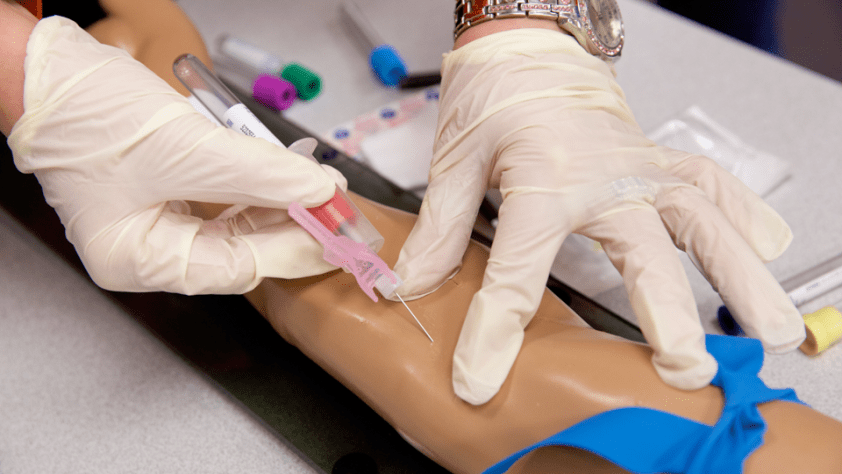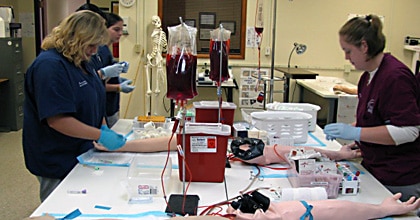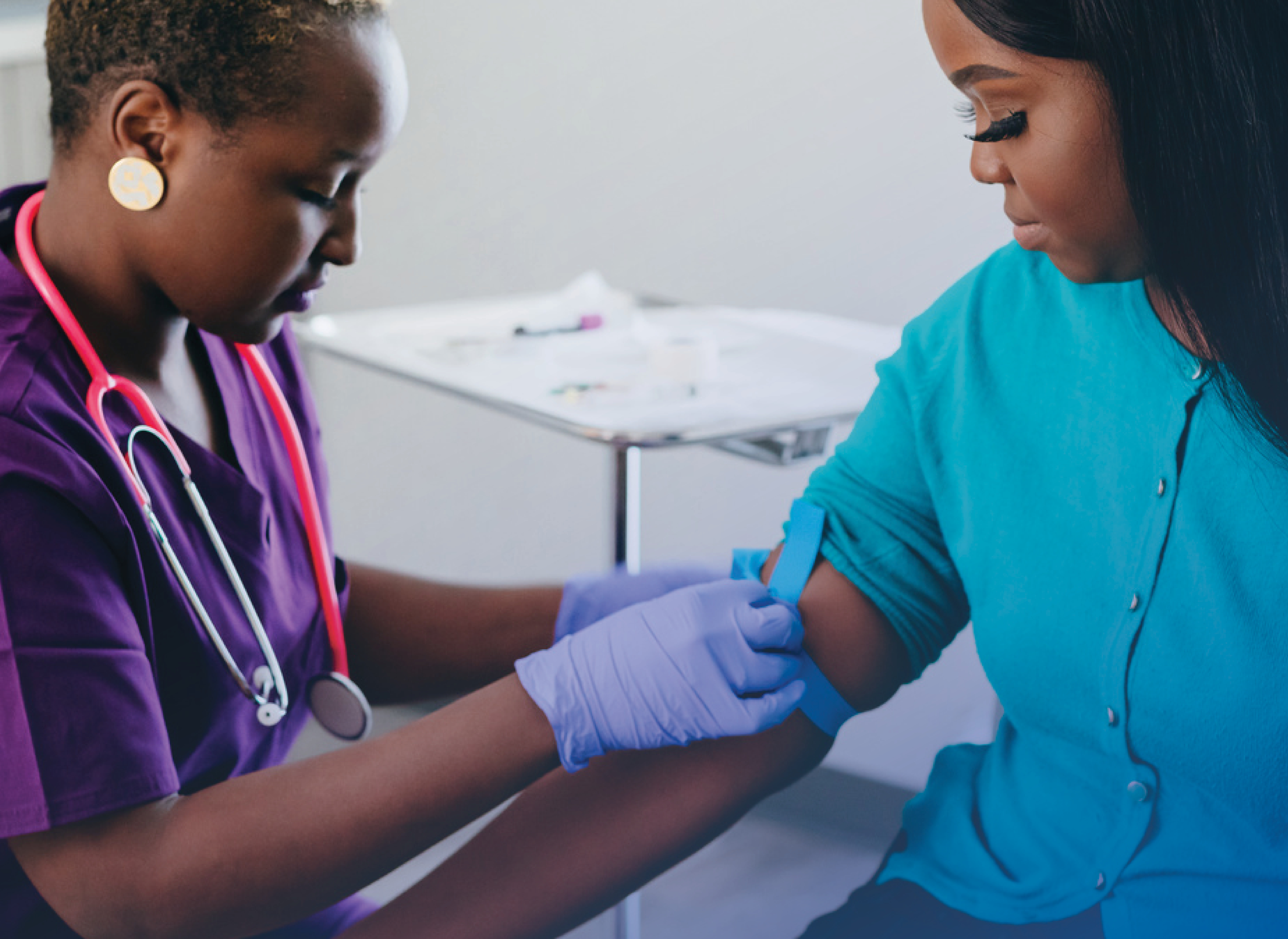Key Things to Learn About Starting a Phlebotomy Training Course Today
Key Things to Learn About Starting a Phlebotomy Training Course Today
Blog Article
The Path to Accreditation: Comprehending the Phlebotomy Educating Course Journey and Its Relevance
As you take into consideration the path to certification in phlebotomy, it's essential to understand the duty you'll play in healthcare. Your training will certainly cover important abilities, from blood collection strategies to patient communication.

The Duty of Phlebotomists in Medical Care
Phlebotomists play an important duty in the healthcare system, acting as the vital link in between people and crucial diagnostic screening. You'll carry out blood draws, making certain examples are gathered precisely and safely. Your experience aids in diagnosing clinical conditions, monitoring health and wellness, and leading treatment choices.
In your day-to-day communications, you'll require to develop trust fund with clients, making them really feel comfortable throughout what could be a stressful experience. You're liable for identifying and managing examples carefully to prevent contamination or mistakes, which might affect test results.
Beyond this, you'll usually work together with physicians and nurses, interacting essential details about clients' conditions. Your duty is essential in preserving the operations in healthcare settings, guaranteeing prompt and exact outcomes. By mastering your skills, you add meaningfully to client treatment, making you an indispensable component of the medical group. Accepting this obligation is vital to your success as a phlebotomist.
Overview of Phlebotomy Training Programs
When checking out phlebotomy training programs, you'll discover different types made to fit various schedules and finding out designs. Each program aids you establish crucial skills like blood collection and client communication. Comprehending these choices is essential to picking the ideal path for your job.
Sorts Of Training Programs
Numerous types of training programs are offered for those looking to come to be skillful in phlebotomy. In addition, some healthcare facilities and centers offer on-the-job training programs, giving practical experience while you learn. Whatever course you select, each program aims to outfit you with the required abilities for an effective phlebotomy job.

Trick Skills Created
Grasping phlebotomy calls for a set of vital skills that are developed with comprehensive training programs. You'll discover technical abilities like appropriate vein option, needle insertion, and blood collection methods. These hands-on methods guarantee you can perform procedures securely and efficiently. Furthermore, communication skills are essential; you'll require to connect with individuals, discuss treatments, and placed them secure. Recognizing anatomy and physiology is vital, too, as it aids you locate blood vessels and recognize the body's reaction to blood attracts. Finally, you'll get knowledge of safety methods and infection control, guaranteeing you maintain a clean and sterile environment. Each of these skills is necessary for your success as a qualified phlebotomist, making you a beneficial possession in any kind of medical care setting.
Trick Components of a Phlebotomy Training Course
In a phlebotomy course, you'll concentrate on vital subjects that prepared for your future profession. You'll take part in hands-on training that allows you to use what you've discovered in real-world setups. Both the curriculum and sensible experience are important for your success as a phlebotomist.
Curriculum Review
While seeking a phlebotomy training course, you'll run into a core curriculum created to outfit you with fundamental skills and expertise. Phlebotomy Courses Near Me. This curriculum normally consists of anatomy and physiology, concentrating on the blood circulation system and recognizing blood components. You'll likewise learn more about different sorts of blood collection techniques, consisting of venipuncture and capillary puncture methods
In addition, infection control and safety and security protocols are important elements, guaranteeing you recognize just how to maintain a sterile environment. You'll research patient communication, emphasizing communication and empathy, which are important for reducing individual anxiousness. Ultimately, moral and lawful factors to consider will certainly be addressed, preparing you for real-world obligations. This foundational knowledge will enable you to excel as a phlebotomist and provide top quality treatment in professional setups.
Hands-On Training Experience
Getting hands-on experience is an important component of your phlebotomy training program. This functional training enables you to use what you have actually learned in a real-world setting, enhancing your abilities and confidence. You'll exercise venipuncture techniques, find out how to deal with various kinds of specimens, and get acquainted with the devices read this article made use of in the field. Under the advice of seasoned instructors, you'll refine your abilities, ensuring you're planned for any type of circumstance you might encounter.
Furthermore, you'll get the possibility to interact with individuals, which is necessary for establishing your communication abilities. This combination of technological efficiency and interpersonal skills is essential for your success as a certified phlebotomist. Eventually, hands-on training is where concept meets method, solidifying your understanding and preparedness for qualification.
Qualification and Licensing Requirements
Before you can begin your career in phlebotomy, it is important to comprehend the qualification and licensing requirements that vary by state. The majority of states require phlebotomists to hold an accreditation from an acknowledged company, such as the National Phlebotomy Organization or the American Society for Medical Pathology. These accreditations commonly involve passing an examination that examines your expertise and skills in the field.
In addition to accreditation, some states have certain licensing demands. You might require to finish a certain variety of hours in professional practice, submit proof of training, or undergo a background check. It is very important to research your state's policies to make certain you meet all required requirements.
Remaining educated concerning these needs not just aids you look at this site safeguard a placement yet additionally boosts your credibility as a professional. By satisfying these demands, you'll be well on your method to an effective occupation in phlebotomy.
Hands-On Training and Practical Experience
Hands-on training and functional experience are necessary elements of your phlebotomy education, as they allow you to apply theoretical expertise in real-world circumstances. Throughout your training, you'll engage in monitored venipuncture, find out appropriate methods, and become acquainted with numerous blood collection devices. This direct participation is important for constructing your self-confidence and developing your skills.
You'll function carefully with experienced specialists who can guide you via the nuances of patient communication and sample handling. Each session not just strengthens your understanding but additionally prepares you for the hectic environment of health care settings.
In addition, numerous programs include professional rotations, enabling you to experience varied setups, from hospitals to outpatient centers. This exposure aids you adapt to different obstacles and person requirements, guaranteeing you're well-prepared for your future role. Accept these opportunities, as they're important to becoming a proficient and thoughtful phlebotomist.
Challenges Encountered During Training
While obtaining hands-on experience is vital, it is necessary to acknowledge the difficulties that can occur during your phlebotomy training. You could run into anxiousness when doing procedures on actual clients, specifically if you're brand-new to the environment. The pressure to obtain everything right can be overwhelming. Furthermore, understanding the skills required for blood draws takes technique; you might battle with method at first.
Time administration can likewise be a difficulty, as harmonizing concept, sensible sessions, and individual dedications can really feel intimidating. You might deal with varying learning paces among your peers, resulting in feelings of self-doubt if you think you're falling back. Finally, adjusting to the various individualities of teachers can be tough, as each might have an unique teaching design.
Recognizing these obstacles early on can prepare you for success and help you create strength throughout your training journey.
Profession Opportunities After Certification

As you gain experience, you might even take into consideration specializing in locations like pediatric or senior citizen phlebotomy, dealing with particular patient demands. Some phlebotomists choose to advance their basics jobs by ending up being laboratory service technicians or pursuing further education and learning in health care fields.
In addition, your qualification can result in duties in training or overseeing brand-new phlebotomists, allowing you to share your understanding. With the medical care sector constantly expanding, your abilities will certainly always be in demand, leading the way for a steady and meeting career. Embrace the chances awaiting you!
Often Asked Inquiries
What Is the Common Period of a Phlebotomy Educating Training Course?
Phlebotomy training programs generally last around four to 8 weeks. You'll take part in hands-on technique, class guideline, and online learning. Completing this training prepares you for accreditation and a rewarding profession in health care.
Are Online Phlebotomy Courses Available?
Yes, on the internet phlebotomy programs are readily available. They supply adaptability and ease, allowing you to research at your very own pace. Just verify the program is certified to satisfy accreditation requirements and acquire important skills for your career.
Just How Much Does Phlebotomy Training Generally Cost?
Phlebotomy training generally costs between $700 and $2,500, depending on the program and location. You should take into consideration variables like training course length, included materials, and hands-on experience when picking the ideal training for you.
What Prevail Prerequisites for Phlebotomy Training?
Common requirements for phlebotomy training typically include a senior high school diploma or GED, immunizations, and a history check. Some programs may also need basic medical care knowledge or qualifications, ensuring you're planned for hands-on training.
Can I Function While Completing My Phlebotomy Training?
Yes, you can function while completing your phlebotomy training. Several trainees equilibrium jobs with their researches, but make particular to manage your time properly to ensure you meet both work and training commitments efficiently.
Report this page